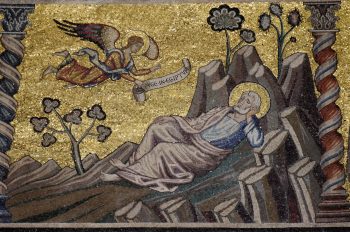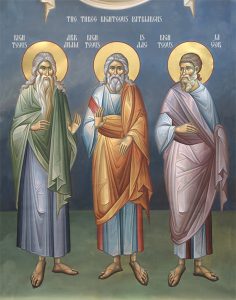Light of Patriarchs, Pray for us

Fr John Rea SM
Fr John Rea was curious about the traditional title of St Joseph as ‘Light of the Patriarchs’.
This is what he discovered...
What can we learn from Biblical patriarchs that will help deepen our appreciation of St Joseph?
Abraham’s stand-out quality is his faith. St Paul writes about it in his letters to the Romans and to the Galatians. He tells us in the letter to the Romans that Abraham is our father in faith. And in his letter to the Galatians he writes, “Just as Abraham ‘believed God, and it was reckoned to him as righteousness’ so you see those who believe are the descendants of Abraham and the Scripture, foreseeing that God would justify the Gentiles by faith, declared the Gospel beforehand to Abraham, saying; ‘All the Gentiles will be blessed in you.’ For this reason, those who believe are blessed with Abraham who believed.” (Galatians 3: 6-9).
God tested Abraham’s faith more than once. Abraham had a faith dark night when God told him to sacrifice the son he had promised him, and barren Sarah, when the patriarch was seventy-five. Only the intervention of an angel stopped him well over twenty-five years later from obeying God’s command.

"Flee to Egypt", 13th-century mosaic, Florence Baptistry
Photo by © Marie-Lan Nguyen / Wikimedia Commons, CC BY 2.5,
https://commons.wikimedia.org/w/index.php?curid=21570852
This happening throws light on St Joseph’s remarkable faith. A commentator on Matthew and Luke’s Annunciation Narratives concludes that Our Lady straight away shared the fact of the angel’s visit, and her pregnancy, with St Joseph because as her covenanted husband he had a right to know. St Joseph believes her. He believes, on her word, that the angel visited her that she has conceived of the Holy Spirit even though there is no outward physical sign that she is pregnant.
With Our Lady’s revelation to him, our saint suffers inner turmoil. What does God want him to do? How is he to deal with this amazing turn of events?

Icon of Saints Abraham, Isaac and Jacob
Saints and scholars have suggested one of three possible causes for St Joseph’s dark night.
According to St Bernard, St Thomas, and others a reverent fear, a holy awe, has him on the point of withdrawing from the scene. He has a holy concern that he is treading on sacred ground where he has no right to be. His feelings are like the feelings of the Patriarch Jacob who after a dream, and God’s words to him in that dream at Bethel, said; “Surely the Lord is in this place and I did not know it.” He was afraid and said, “How awesome is this place. This is none other than the house of God, and this is the gate of heaven.”
An angel appeared to Abraham and prevented him from sacrificing Isaac. So too, an angel comes to our saint in a dream and reveals to him his vocation as protector and provider for both Jesus and the Blessed Virgin. On rising, St Joseph immediately completes the marriage rite and brings Mary into his house. He does this before Our Lady departs for the hill country of Judea and, therefore, before there is any sign that she is with child. It had to be this way because this is small town Galilee where everyone knows everyone else’s business. Quick action on our saint’s part leads people to assume that Jesus is the biological son of Joseph the carpenter.
Is there any feature of Isaac’s life that seems to reflect St Joseph? Yes, their union with God in prayer.
When Rebecca arrives from Haran to be his wife, Isaac, the Bible tells us, is out in the field meditating. Eight times in the ensuing chapters of Genesis we find the patriarch praying. He is a zadik, a Hebrew holy man. Benedict XVI tells us that by calling St Joseph, a ‘just man’. Matthew is saying that our saint too is a zadik (Matthew 1: 19). The Pope Emeritus quotes two Scriptures that describe a zadik. One of them is Jeremiah 17: 7-8. “Blessed is the man who trusts in the Lord, whose trust is the Lord. He is like a tree planted by water, that sends out its roots by the stream, and does not fear when heat comes, for its leaves remain green, and is not anxious in the year of drought, for it does not cease to bear fruit.” Water is a common biblical symbol of the Holy Spirit and when we interpret the text symbolically, the fruit it speaks of are the Fruits of the Holy Spirit in which St Joseph abounded –– love, joy, peace, kindness, goodness, faithfulness, gentleness and self-control (Galatians 5: 22-23).
St Joseph is also like Joseph son of Jacob. Not only do the two share the same name but the Holy Spirit gave prophetic dreams to both. Both went down in to Egypt. Both are models of chastity. Both have that practical wisdom that we call prudence. The earlier Joseph became second only to Pharoah as a ruler in Egypt. Blessed Pope Pius IX made St Joseph patron of the universal Church. The first distributed the grain gathered in the seven years of plenty. The second is an intercessor for every kind of blessing.
Go to Joseph.
Light of Patriarchs pray for us.
 Entries(RSS)
Entries(RSS)